Well, the answer is pretty simply; if you don’t know the
basic soccer rules you will not either know
how to play soccer. However, you will not need to remember every soccer rule as many of them will not give you any advantage on the field. In this article I have only selected the most necessary ones that you need to learn in order to perform well.
No Rules = An Unfair GameThe game of soccer would be unfair if only your opponents had permission to set the rules for the match. And if both your and the opposing team had permission to make the rules, there would probably be so much discussion about every situation that you, your teammates and the opposing players would not care about how the match ended.
That’s why players, coaches and soccer associations over the whole world have decided which soccer rules should be followed. The referees just make sure that you and other players are following the soccer rules. But what if you get angry at the referee if he/she makes a wrong decision? Like giving the opposing team a penalty kick when their player was not even in the penalty area (also known as the
the box and
18 yard box).
Well, keep in mind always that it is the referee who decides if it is a foul or not. Don’t ever get angry at a referee, even if you do not agree with his/her decision about some particular situation on the soccer pitch. This will result in the referee getting even more stressed and confused, which will lead to more wrong decisions. The referee is also a human being who make mistakes and despite that he knows all the soccer rules perfectly he will still make mistakes. So, lead my advice; spare yourself unnecessary arguing and focus on your game.
How to calm downSometimes it is hard to not get angry at the referee, but keep in mind that there is no reason to complain because a referee will never change his/her decision afterwards. Use your energy to performing well and push yourself to work harder on the soccer field instead. I know this is easy to say when you are not upset on the field, but I usually count to 10 when I get angry at the referee, and after a while I feel better and so will you. I promise :-)
A match begins…A match begins with a handshake between you (if you are the captain of the team) and the opposing team captain. Usually players say hey to each other and wish the referee and the other team good luck. The official soccer rules state that a game must start with a kick off from the centre of the soccer pitch.
End of the matchThe match is over when you and your teammates say "thanks for the match" (this is not a must but the official soccer rules state that this is fair play and should be adapted by all teams) and both teams’ captains handshake the referee and say "thank you for the game" (even if no one is satisfied with the referee’s decisions during the match).
The 17 Fundamental Soccer Rules You Should Learn
Before we start, I just want you to keep in mind that it is not necessary to learn these rules in one day. Instead, reflect over them while you are watching a soccer game and try to memorize at least one of them per week. Now, let’s study these rules in more detail.
The Free Kick
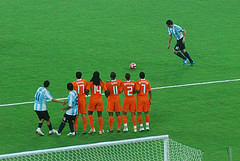
A
soccer freekick is a great scoring opportunity. It is often occurred when one of your opponents commits a foul on either you or one of your teammates (for example; pushing, tripping or missing a slide tackle). The referee may also reward your team with a free kick if one of your opponents touches the ball with his hands.
Dimensions of a Soccer Field
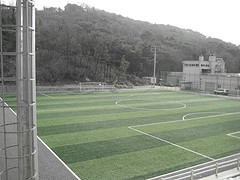
I know by experience that
soccer field dimensions can be pretty confusing, especially if you have recently started to play soccer. However, I know also that many people that have been played soccer many years do not know the size of a regular field. So, how big is a soccer field? Well, the minimum length is 100 yards and maximum 130 yards. The width can be maximum 100 yards or minimum 50 yards.
Size of The Ball
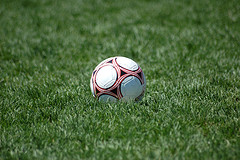
In soccer, there are generally three sizes of soccer balls. Size 5 which is the most common one, size 4 is generally used for U 12 and size 3 for U4. However, there are also custom made balls that are only used for inside play. These balls can’t bounce especially high and are easier to control then if you were playing with an outside ball. An official ball must weigh somewhere between 410 to 450 grams. To get more facts about this rule (e.g.
how many leather panels does a soccer ball have or the general mass) click on
this link.
The Number of Players
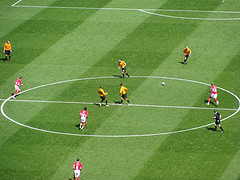
So, how many
players on a soccer team is allowed in a game? Well, accoring to the official soccer rules, a team can have 10 outfield players and one goalie on the field. The amount of substitutions may vary but in official competition games there are only 3 substitutions allowed per team. In other type of games like friendly games or inside soccer the coach is usually allowed to perform an unlimited amount of substitutions. In youth games there are generally 6 outfield players and a goalie. The field and goals are also smaller than the regular ones.
The Equipment You Need To Have
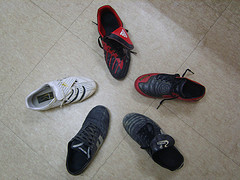
The most basic
soccer equipment you need to wear in order to play in a competition is a jersey, a pair of shorts and socks. You also need a pair of boots and approved shin pads. You will generally need to purchase the last two mentioned of your own money, beside that you don’t need anything more in order to play a soccer game. The colors of your team can’t be the same as the colors of your keeper.
The Soccer Referee
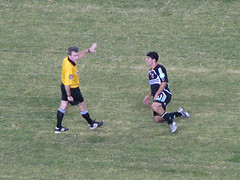
Being a
soccer referee can be pretty though sometimes. Beside knowing all the soccer rules, the referee need also to keep his calm and make right decisions during the whole game. That’s why it is so important to treat the referee with respect. My experience is that if you show respect against the referee, he will do the same against you. But, don’t criticize his decisions as he is also a human being and we all make mistakes. You will never win anything by arguing with him about his decisions; you will just make him more unsecure which will impact on his performance.
The Assistant Referee
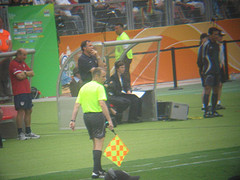
An assistant referee do not acutally make any binding deciisons. During a regualr soccer game two assistant referees oversees the touch lines on each side of the field. The assistant referees were called lines men but in 1996 FIFA changed the soccer rules and came up with a new name to better reflect the modern role of these officials. Still, many people like to referee to them as "referee's assistants" or the "linesmen". The main referee may discuss his decision with the assistant referee but as I said before, he can also refuse them if he believe that they are not correct.
Duration of The Game
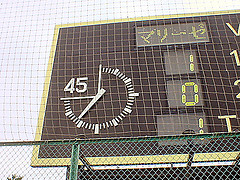
The
duration of the match is different and depends on what competition you are participating in. If you play a regular soccer game (11 vs. 11), the time is 45 minutes per half plus overtime. However, in a cup there can also be extra time, 30 minutes (15 minutes per half). However, if you are playing an inside game the time is usually much shorter (about 12 minutes in futsal).
The Restart of Play
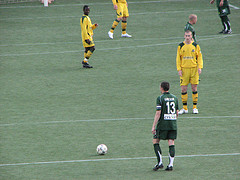
The most common situations where restart of play occurs are following; start of the game, after a goal is scored, at the start of the second half or extra time, a throw in, goal kick and a free kick. You should also know that it is possible to score directly from a kick-off. I’ve seen one of my teammates score few times so I know it is possible.
Ball in and Out of Play
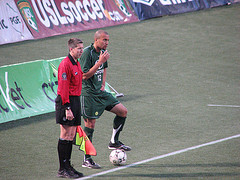
According to the official soccer rules, a soccer ball is out of play when it has wholly crossed the goal or touch line independently on whether the ball is on the ground or in the air. The ball is in play at all other times, plus these; when it rebounds from a goalpost, crossbar or a corner flag and remains on the field. It is also in play when it rebounds from the referee (assistant as well).
Method of Scoring
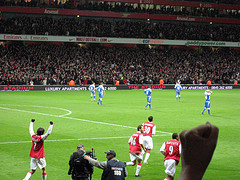
In order to score a goal you need to send the whole ball over the goal line, between the goalposts and also under the crossbar. If not, then the referee might not approve the goal. If your team scores more goals then your opponents, the victory will be yours. However, if the game ends without goals or if both teams score an equal number of goals, then the match will end as draw. In some competitions, the soccer rules are little different as a game cannot end as a draw. Instead, an extra time is added. If the game ends as a draw even after the extra time a penalty shootout is used to determine the winner of the game.
The Offside
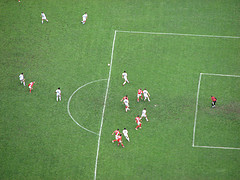
Many people see the
offiside rule in soccer as something very complicated and hard to understand. However, I ensure that it is not more harder to learn than any other of the soccer rules presented in this guide. So, let me give you some examples on some common offside situations. You will be in offside if you are nearer your opponent’s goal line than your second last opponent and the ball. However, you will not be in offside if you are nearer your own half, in level with the second and also in level with the last two opponents.
Fouls and Misconduct
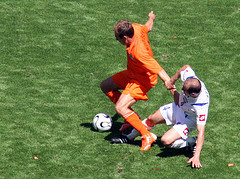
According to the official soccer rules of FIFA, you will be cautioned and the referee will show you the yellow card if you commit any of the following offences; You are delaying the restart of play. The referee found you guilty for unsporting behavior. You are throwing or kicking the ball away after the referee blows his whistle. You are entering or re entering a game without referees permission. Leaving the field without referee’s permission will also get you a yellow card. There are more things that may give you a yellow card but the above mentioned are the most common things players are punished for.
The Penalty Kick
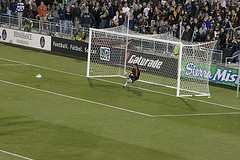
The
soccer penalty kick rule is a type of kick that is taken from twelve yards (about 11 meters) out from the goal line of your opponents. The goal kick taker, keeper and the referee are allowed to stand inside the 18 yard box. However, all other players must remain outside the 18 yard box until the ball is kicked. A player is allowed to kick the ball another time if the ball rebounds back to him. However, during a penalty shootout this rule is not available.
The Throw in
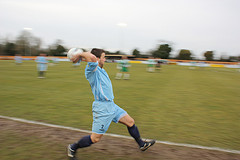
A
soccer throw in is a method for restarting a soccer game. Your team will be awarded with a throw in when some of your opponents is the last player on the ball before it leaves the side line. It is also important to keep in mind that the whole ball must be completely over the side line (also known as the touch line).
The Goal Kick
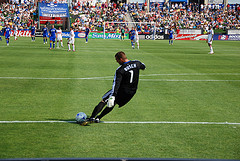
Your team will be awarded with a
goal kick when the ball has completely crossed the goal line. The ball must also be touch by one of your opponents. The official soccer rules state that as a goalie, you will have 6 seconds from placing the ball onto the ground to sending it upon the field. If you refuse to take the kick during the six seconds, the referee may punish you with a yellow card or an indirect free kick. You can also score a goal directly form the goal kick. However, you really need to have powerful kicks in order to succeed with that.
The Corner Kick
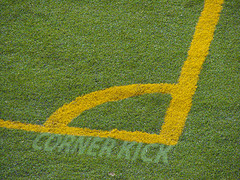
A
soccer corner kick is another way of restarting a soccer game. It is also a very good scoring opportunity; in fact, many goals are scored from this type of kick. When taking a corner kick you need to control that your opponents are at least 10 yards from the ball. Keep in mind also that as soon as you touch the ball it will be counted as being in play.
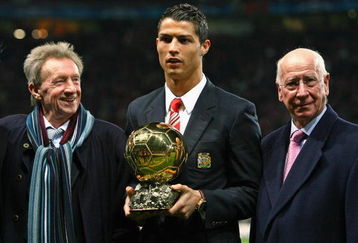

 Edison (Edson) Arantes do Nascimento aka Pelé
Edison (Edson) Arantes do Nascimento aka Pelé
 Thierry Henry
Thierry Henry


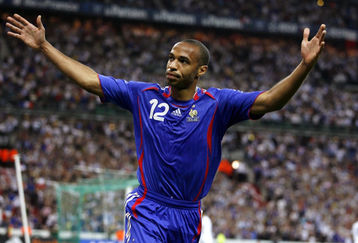









 SHAY GIVEN
SHAY GIVEN BOBBY MONCUR
BOBBY MONCUR JOE HARVEY
JOE HARVEY FRANK CLARK
FRANK CLARK CHRIS WADDLE
CHRIS WADDLE PAUL GASCOIGNE
PAUL GASCOIGNE KEVIN KEEGAN
KEVIN KEEGAN PETER BEARDSLEY
PETER BEARDSLEY HUGHIE GALLACHER
HUGHIE GALLACHER JACKIE MILBURN
JACKIE MILBURN ALAN SHEARER
ALAN SHEARER A
A  I know by experience that
I know by experience that  In soccer, there are generally three sizes of soccer balls. Size 5 which is the most common one, size 4 is generally used for U 12 and size 3 for U4. However, there are also custom made balls that are only used for inside play. These balls can’t bounce especially high and are easier to control then if you were playing with an outside ball. An official ball must weigh somewhere between 410 to 450 grams. To get more facts about this rule (e.g.
In soccer, there are generally three sizes of soccer balls. Size 5 which is the most common one, size 4 is generally used for U 12 and size 3 for U4. However, there are also custom made balls that are only used for inside play. These balls can’t bounce especially high and are easier to control then if you were playing with an outside ball. An official ball must weigh somewhere between 410 to 450 grams. To get more facts about this rule (e.g.  So, how many
So, how many  The most basic
The most basic  Being a
Being a  An assistant referee do not acutally make any binding deciisons. During a regualr soccer game two assistant referees oversees the touch lines on each side of the field. The assistant referees were called lines men but in 1996 FIFA changed the soccer rules and came up with a new name to better reflect the modern role of these officials. Still, many people like to referee to them as "referee's assistants" or the "linesmen". The main referee may discuss his decision with the assistant referee but as I said before, he can also refuse them if he believe that they are not correct.
An assistant referee do not acutally make any binding deciisons. During a regualr soccer game two assistant referees oversees the touch lines on each side of the field. The assistant referees were called lines men but in 1996 FIFA changed the soccer rules and came up with a new name to better reflect the modern role of these officials. Still, many people like to referee to them as "referee's assistants" or the "linesmen". The main referee may discuss his decision with the assistant referee but as I said before, he can also refuse them if he believe that they are not correct. The
The  The most common situations where restart of play occurs are following; start of the game, after a goal is scored, at the start of the second half or extra time, a throw in, goal kick and a free kick. You should also know that it is possible to score directly from a kick-off. I’ve seen one of my teammates score few times so I know it is possible.
The most common situations where restart of play occurs are following; start of the game, after a goal is scored, at the start of the second half or extra time, a throw in, goal kick and a free kick. You should also know that it is possible to score directly from a kick-off. I’ve seen one of my teammates score few times so I know it is possible. According to the official soccer rules, a soccer ball is out of play when it has wholly crossed the goal or touch line independently on whether the ball is on the ground or in the air. The ball is in play at all other times, plus these; when it rebounds from a goalpost, crossbar or a corner flag and remains on the field. It is also in play when it rebounds from the referee (assistant as well).
According to the official soccer rules, a soccer ball is out of play when it has wholly crossed the goal or touch line independently on whether the ball is on the ground or in the air. The ball is in play at all other times, plus these; when it rebounds from a goalpost, crossbar or a corner flag and remains on the field. It is also in play when it rebounds from the referee (assistant as well). In order to score a goal you need to send the whole ball over the goal line, between the goalposts and also under the crossbar. If not, then the referee might not approve the goal. If your team scores more goals then your opponents, the victory will be yours. However, if the game ends without goals or if both teams score an equal number of goals, then the match will end as draw. In some competitions, the soccer rules are little different as a game cannot end as a draw. Instead, an extra time is added. If the game ends as a draw even after the extra time a penalty shootout is used to determine the winner of the game.
In order to score a goal you need to send the whole ball over the goal line, between the goalposts and also under the crossbar. If not, then the referee might not approve the goal. If your team scores more goals then your opponents, the victory will be yours. However, if the game ends without goals or if both teams score an equal number of goals, then the match will end as draw. In some competitions, the soccer rules are little different as a game cannot end as a draw. Instead, an extra time is added. If the game ends as a draw even after the extra time a penalty shootout is used to determine the winner of the game. Many people see the
Many people see the  According to the official soccer rules of FIFA, you will be cautioned and the referee will show you the yellow card if you commit any of the following offences; You are delaying the restart of play. The referee found you guilty for unsporting behavior. You are throwing or kicking the ball away after the referee blows his whistle. You are entering or re entering a game without referees permission. Leaving the field without referee’s permission will also get you a yellow card. There are more things that may give you a yellow card but the above mentioned are the most common things players are punished for.
According to the official soccer rules of FIFA, you will be cautioned and the referee will show you the yellow card if you commit any of the following offences; You are delaying the restart of play. The referee found you guilty for unsporting behavior. You are throwing or kicking the ball away after the referee blows his whistle. You are entering or re entering a game without referees permission. Leaving the field without referee’s permission will also get you a yellow card. There are more things that may give you a yellow card but the above mentioned are the most common things players are punished for. The
The  A
A  Your team will be awarded with a
Your team will be awarded with a  A
A